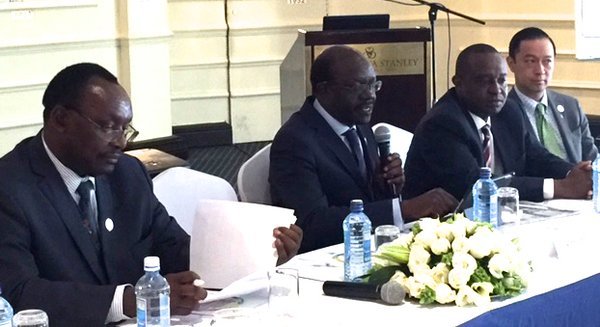UNCTAD convened a panel discussion on "Price Slump in Commodities: Financial Implications for Commodity Exporters" as a part of a series of high-level events organized together with the Government of Kenya on the margins of the WTO MC10 Conference in Nairobi on 17 December.
The panel of distinguished speakers explored the impact of the current downturn in the commodity super-cycle on external debt sustainability in commodity dependent developing countries and discussed core policy implications.
The panel discussion was opened by UNCTAD's Secretary-General, Dr. Mukhisa Kituyi, with an in-depth discussion of the challenges and risks arising from continued commodity dependency for the financing of development, and the use of debt as a financing tool, in particular. UNCTAD built on this analysis in a presentation that highlighted the links between two exogenous shocks affecting commodity dependent developing countries: the downswing in commodity prices itself and the pro-cyclicality of international capital flows that entails often sharply rising borrowing costs during bust periods. The presentation provided core empirical insights into the economic dynamics at stake, and explored core policy implications and proposals.
The Honorable Minister of Trade and Industry of Rwanda, François Kanimba, acknowledged the relevance and urgency of the challenges raised, and highlighted the need for stronger regional integration and cooperation, as well as for sustainable and effective diversification strategies to facilitate climbing up the technological ladder, as medium to longer-term policy responses. Mr. Kanimba also emphasized the need for domestic financial sector reforms to ensure closer and direct links with the real sectors of the affected economies. In this, he was seconded by the Honorable Cabinet Secretary to the Treasury of Kenya, Henry Rotich, who also highlighted the importance of both domestic financial sector reforms as well as longer-term diversification strategies. Mr. Rotich furthermore provided a detailed overview over Kenya's immediate policy responses and agenda to address the exogenous shock of falling commodity prices, including fiscal consolidation measures and innovative approaches to restructuring a range of subsidies and excises.
His Excellency, Mr. Thomas Trikasih Lembong, the Minister of Trade and Industry of Indonesia highlighted the mitigating role that might be played by new sources of liquidity in the form of Eurobonds and debt held in the Chinese Remninbi, and stressed the key significance of enabling private investment and private sector activities, more generally. He agreed with his colleagues from Kenya and Rwanda on the core role to be played by stronger regional integration initiatives and ties.
The event was very well received by the audience who expressed strong interest in the topic and, in particular, the concomitant policy discussion.



